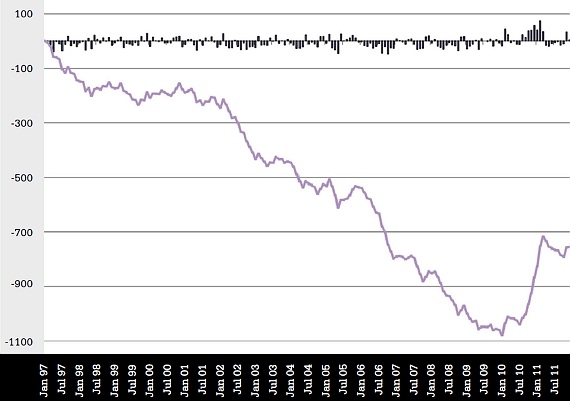Chart of the week - It never rains, then it pours
The extraordinary south-east Australian ‘Millennium Drought’ of 1997 to 2009, which really kicked-in from around 2002, had an incredible impact on agriculture, urban water supplies and public consciousness and concern about climate change.
In 2006-07, the Reserve Bank estimated it reduced Australian GDP by 1 per cent (by comparison carbon pricing’s cumulative impact is about 1 per cent each decade). The depth of concern over water supplies was so severe that now Adelaide, Melbourne, Sydney and Brisbane have each joined Perth is setting up desalination plants (lying pretty much idle now, except for Perth).
The chart of the week below, taken from the recent Climate Commission’s report, illustrates just how severe this drought was and why people were so deeply concerned. It also shows how abruptly the drought was reversed in late 2009 and 2010.
Cumulative rainfall variations (in mm) from the long-term average for south-east Australia – 1997 to 2011

Note: individual monthly variations are shown in bar columns along the top of the chart. Cumulative change is indicated by purple line.
Source: Bureau of Meteorology, cited by Climate Commission (2013).
Climate Institute research indicates that the severe drought was a major influence on the public’s high degree of concern surrounding climate change in 2007 and 2008. While Australia has always experienced bad droughts, this one was so beyond the public’s lived experience that it caused them to question whether something seriously unusual was occurring.
However this concern, and the belief that humans are changing the climate, has declined since the drought ended.
Interestingly, research from the United States also shows that public concern about climate change is linked with the recent incidence of extreme weather events.
It is perhaps incredibly unfortunate timing that almost precisely at the time the drought ended, a climate sceptics coup against Malcolm Turnbull took place. The subsequent scare-mongering about carbon pricing and xenophobic suggestions that Australia was acting in advance of other countries, has undoubtedly undermined the public’s acceptance of the need for Australia to reduce its emissions.
















